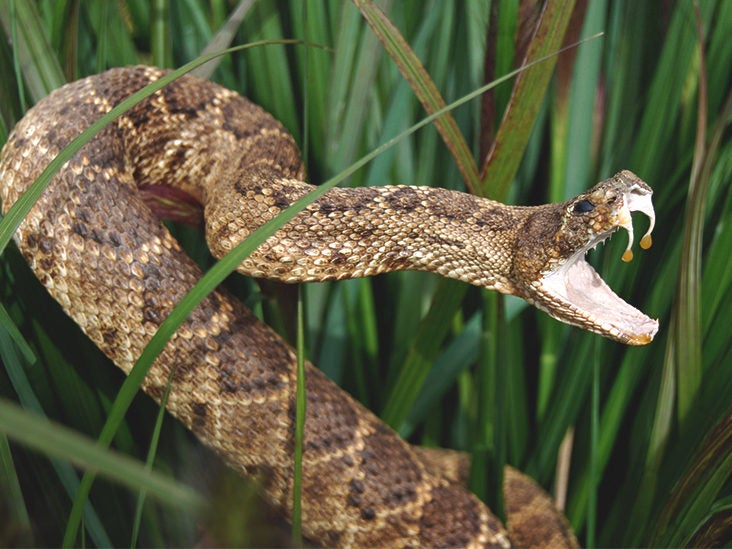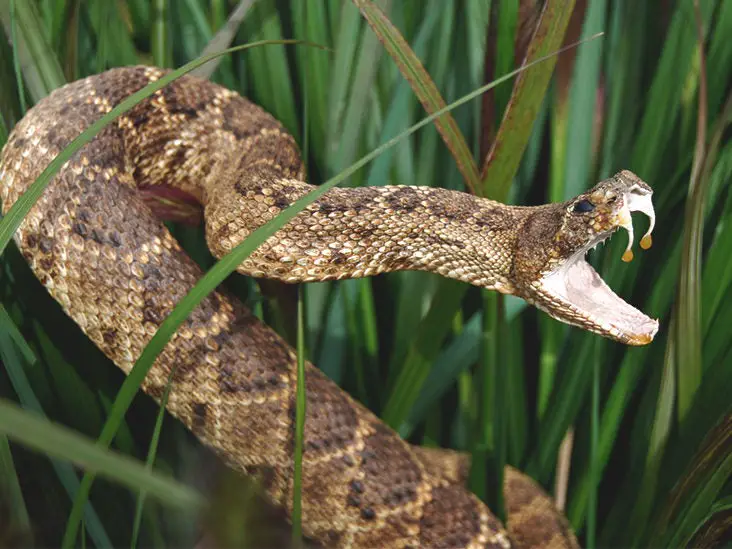Rattlesnake bites are one of the most feared and dangerous animal attacks in North America. These venomous snakes are found in many regions of the United States and Mexico, and their bites can be fatal if left untreated.
When a rattlesnake bites, it injects venom into the victim’s bloodstream, which can cause a range of symptoms from mild to severe. Understanding the signs of a rattlesnake bite and knowing what to do in an emergency can be the difference between life and death. Read on to learn more about this fascinating yet deadly creature.
Rattlesnake bites are venomous bites from snakes belonging to the Crotalus genus. These snakes are found in North and South America and have a distinctive rattle on their tail. Rattlesnake bites can cause severe pain, swelling, and even death if left untreated. If bitten, seek medical attention immediately.

What Are Rattlesnake Bites?
Rattlesnake bites are venomous bites that occur when a rattlesnake injects venom into the body of a person or an animal. Rattlesnakes are found in North and South America and are known for their distinctive rattles that they use to warn others when they feel threatened.
How Does a Rattlesnake Bite Occur?
Rattlesnake bites typically occur when a person or an animal accidentally steps on or disturbs a rattlesnake. Rattlesnakes usually bite as a defense mechanism when they feel threatened or cornered. The fangs of a rattlesnake are long and hollow, and they inject venom into the victim’s body when they bite.
The severity of a rattlesnake bite depends on several factors, including the size and type of snake, the amount of venom injected, and the location of the bite. A rattlesnake bite can cause a range of symptoms, from mild pain and swelling to life-threatening complications.
What Are the Symptoms of a Rattlesnake Bite?
The symptoms of a rattlesnake bite can vary depending on the severity of the bite. Some common symptoms include:
1. Pain and Swelling: The area around the bite may become painful and swollen.
2. Nausea and Vomiting: Some people may experience nausea and vomiting after a rattlesnake bite.
3. Weakness and Dizziness: Rattlesnake venom can cause weakness and dizziness, which may lead to fainting.
4. Difficulty Breathing: Severe rattlesnake bites can cause difficulty breathing, which can be life-threatening.
What Should You Do If You Are Bitten by a Rattlesnake?
If you are bitten by a rattlesnake, it is important to seek medical attention immediately. The following steps can help reduce the severity of the bite:
1. Call for Help: Call 911 or your local emergency services immediately.
2. Stay Calm: Try to stay calm and avoid moving too much, as this can spread the venom.
3. Remove Clothing and Jewelry: Remove any clothing or jewelry from the area around the bite, as it may become swollen.
4. Wash the Bite: Wash the bite with soap and water to help prevent infection.
5. Keep the Area Immobilized: Keep the affected limb immobilized and at or below the level of the heart to help slow the spread of venom.
How Are Rattlesnake Bites Treated?
Treatment for rattlesnake bites typically involves administering antivenom, which is a medication that neutralizes the venom. Other treatments may include pain relief medication, tetanus shots, and wound care.
The severity of the bite and the amount of venom injected can affect the treatment plan. In some cases, hospitalization may be necessary, especially if the bite is severe or if the victim is experiencing life-threatening complications.
Rattlesnake Bites: Benefits Vs. Risks
While rattlesnake bites can be dangerous, these snakes play an important role in the ecosystem. Rattlesnakes help control rodent populations, which can help prevent the spread of disease.
However, it is important to take precautions to avoid rattlesnake bites, such as staying on designated trails, wearing protective clothing, and being aware of your surroundings. If you do encounter a rattlesnake, it is best to give it plenty of space and avoid disturbing it.
In summary, rattlesnake bites can be a serious medical emergency, but prompt medical attention and treatment can help reduce the severity of the bite. By taking precautions to avoid rattlesnakes, we can coexist with these important members of the ecosystem and help maintain a healthy balance in our environment.
Frequently Asked Questions
Learn more about rattlesnake bites and how to prevent them with these commonly asked questions and answers.
How do rattlesnake bites occur?
Rattlesnake bites occur when a person or animal comes into contact with the venomous fangs of a rattlesnake. The snake’s venom is injected into the victim’s bloodstream and can cause a range of symptoms, from mild pain and swelling to severe tissue damage and even death. Rattlesnakes are found throughout the United States and are most active during the warmer months of the year.
It is important to seek immediate medical attention if you or someone you know has been bitten by a rattlesnake. Time is of the essence when it comes to treating snake bites, and early intervention can help prevent serious complications.
What are the symptoms of a rattlesnake bite?
The symptoms of a rattlesnake bite can vary depending on the severity of the bite and the amount of venom injected. Common symptoms include pain, swelling, and redness at the site of the bite, as well as nausea, vomiting, and dizziness. In more severe cases, victims may experience difficulty breathing, low blood pressure, and even paralysis.
If you suspect that you or someone you know has been bitten by a rattlesnake, it is important to seek medical attention right away. Early treatment can help prevent serious complications and improve the chances of a full recovery.
How are rattlesnake bites treated?
The treatment for rattlesnake bites typically involves a combination of antivenom medication, pain management, and supportive care. Antivenom is a specialized medication that neutralizes the venom in the victim’s bloodstream and helps prevent further damage to the body’s tissues.
In addition to antivenom, victims may receive pain medication, anti-inflammatory drugs, and fluids to help manage their symptoms and support their recovery. It is important to follow all treatment instructions carefully and to seek follow-up care as needed to ensure a full recovery.
How can rattlesnake bites be prevented?
The best way to prevent rattlesnake bites is to avoid contact with these venomous snakes whenever possible. If you are hiking or camping in a rattlesnake habitat, be sure to wear long pants and sturdy boots to protect your legs and feet. Avoid walking through tall grass or dense underbrush, and be aware of your surroundings at all times.
If you do encounter a rattlesnake, give it plenty of space and do not attempt to handle or capture it. Remember that rattlesnakes are protected species in many areas, and killing or injuring them is illegal in some jurisdictions.
Can rattlesnake bites be fatal?
While rattlesnake bites can be serious and even life-threatening, they are rarely fatal when treated promptly and effectively. Most victims recover fully from their injuries with proper medical care and follow-up treatment.
However, it is important to remember that rattlesnake bites can cause permanent tissue damage and long-term complications if left untreated or if treatment is delayed. If you or someone you know has been bitten by a rattlesnake, seek medical attention right away to ensure the best possible outcome.
What Happens if a Rattlesnake BITES You?
In conclusion, rattlesnake bites are a serious matter that should not be taken lightly. These venomous snakes can be found in many different parts of the world, and their bites can be extremely dangerous. However, with proper treatment and care, most people are able to recover from a rattlesnake bite without any serious long-term effects.
If you are ever bitten by a rattlesnake, it is important to seek medical attention immediately. The first step in treatment is to try and keep the affected area as still as possible, in order to prevent the venom from spreading throughout your body. In addition, you may be given antivenom medication to help counteract the effects of the venom.
Overall, while rattlesnake bites can be scary and potentially life-threatening, it is important to remember that they are also relatively rare. By taking basic precautions when hiking or exploring the outdoors, such as wearing sturdy boots and staying aware of your surroundings, you can help minimize your risk of encountering a rattlesnake and reduce the likelihood of being bitten.


